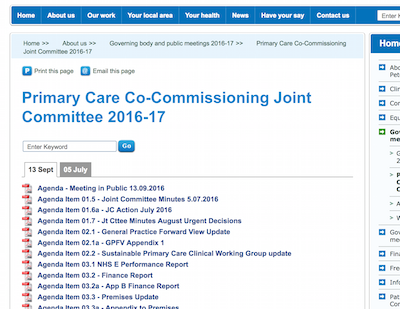
Primary Care (GP) services in Cambridgeshire and Peterborough are currently commissioned by a joint committee comprising representatives of the Cambridgeshire Peterborough Clinical Commissioning Group and NHS England. The committee is responsible for an annual £118m budget.
I would like to see the committee made up of local elected representatives. Currently no elected representatives are on the committee, it is made up of NHS directors from NHS England along with officers and appointees from the Clinical Commissioning Group.
While some minor devolution is currently proposed in Cambridgeshire and Peterborough, local democratic control over NHS budgets would be real substantive devolution.
The arrangements appear to allow local Health and Wellbeing Boards to appoint someone to have a non-voting seat at the table, but no councillors have even been given those seats.
While the body isn’t democratic, it is at least local, and it has a public question slot at its meetings (albeit at the end after decisions are made).
There are a few comments and suggestions relating to GP practices which I have wanted to make for some time, and I intend to use the public question slot to ask the committee if it would be prepared to consider the following matters at a future meeting:
- In the interests of the prevention of illness and injuries is the committee in a position to encourage, or require, anonomised feedback from GPs to organisations whose practices are known to be, or appear to be, causing harm.
For example could GPs in Cambridge dealing with university students with mental health problems be encouraged to ask about the practices within universities which may have contributed to, or caused, the problems. Organisations might well change their practices if they were aware of the degree to which they cause harm.
I am seeking, and suggesting, a feedback loop which would operate in less striking cases than those which prompt a report to prevent future deaths from the coroner.
- On the 1st of August 2016 The Telegraph reported:
“A toddler suffered the ‘worst chickenpox doctors had ever seen’ after his mother was allegedly turned away by a GP’s receptionist” … “she was refused an appointment at her local GP surgery because a receptionist did not think the condition was severe enough to warrant a visit.”
Prompted by these reports, which appear to relate to a Cambridgeshire GP surgery, can the committee review the role of receptionists, and systems within GP practices, for controlling access to care, and more generally review dismissive practices such as routinely telling people to go away and come back in a week or two, or otherwise dealing brusquely especially with those presenting an issue for the first time to a doctor.
- I can see the committee does take an interest in GP catchment areas; could it look into what appears to me subjectively to be the case in Cambridge where the best GP practices have small catchment areas in rich parts of the city, which means many people can’t choose to become patients there? Can the popular practices, with good patient feedback be expanded? Can the quality of GP services across the city be raised to the level of the best GP practices?
Other Notable Points
The committee’s agenda for the 13th of September 2016 contains a proposed resolution to exclude the public, but there are no agenda items following that resolution.
It’s hard to find the current members of the committee; the minutes of the last meeting show who attended that (Julian Huppert was impressively present twice) and the terms of reference show who was a member when the group was set up.
It appears there may be a route for asking questions to the committee in writing, rather than in person, but this isn’t formalised or publicised.
The meeting papers were not published a week before the meeting.
One response to “Lobbying the Local GP Commissioning Committee”
I attended and filmed the meeting:
My public question was taken at 1hr 18m 23s; direct link:
http://www.youtube.com/watch?v=BxiwD43cBwk&t=78m23s
I was able to say everything I wanted to say, and took just over four minutes to do so.
My aim was to get these items considered by the committee in the future, some responses were provided straight away.
On contact with the university (which I only used as an example) a member said there was a process for informing the university about drug use, and said they would take my suggestion for feedback on a wider range of matters to the local GPs.
The responses on access appeared to relate primarily to the ability of registered patients to access services, rather than the ability of patients to register at a practice of their choice.